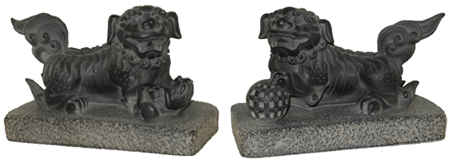Pixiu
30 01 2008Pixiu (貔貅 )
[audio:pi2.mp3,xiu1.mp3]
A fabulously fierce beast called Pixiu (貔貅 ), is believed to be more powerful than the lion or any other animal, and in ancient literature, it is referred to as Mengshou (猛獸 ) or ‘Fierce Beast’ and enters into popular folklore and folk belief that it is a guardian animal that stands for fair-lay and right.
In the Shizhouji (十洲記 ), contained in the huge Taoist compilation Daocang (道藏 ), it notes that: In the third year of the reign Zhenghe (征和 ) [90 B.C.], when the Han Emperor Hanwudi (漢武帝 ) visited An-ting, the King of the Western barbarians, offered a ‘Fierce Beast’ (Mengshou) that resembled a fifty or sixty day-old puppy, as large as a civet but brown in color. He ordered his envoy to present it to the Emperor. When the Emperor saw the envoy holding it as if it were a dog which looked emaciated, hairless and weak, he doubted the genuineness of the tribute.
He asked the envoy, “Can this little animal be trained? Why is it called a Fierce Beast?” “It is actually more fearsome than any of the hundred beast,” replied the envoy. “It must not be criticized on account of its size, for the divine unicorn’s kinship over the elephant, the phoenix’s precedence over the great bird, and the centipede’s dominion over the flying snake also do not depend on size. The ‘Fierce Beast’ exorcises demons [that cause] a hundred evils.” Ashamed and ill-at-ease, Emperor Wu then asked the envoy what method the ‘Fierce Beast’ used to attack other animals, what it ate, what its strength could be compared to, and what country it lived in.
The envoy replied, “As for the ‘Fierce Beast’s origins, some beasts live in Kunlun (崑崙 ), some in Xuanpu(玄圃 ), some in Jukuzhou (聚窟洲 ), and some in Tianlu (天禄 ). It does not exhaust its life-span, it feeds on air and drinks dew, understand human speech, is humane, intelligent, loyal, and forgiving. As for its humanity, it loves and protects the lower orders so that they are not harmed by tigers and leopards. As for its fearsomeness, with a single cry it can subdue a thousand men, frighten the various domestic animals and the hundred creatures into breaking their tethers, and make soldiers lose their strength all at once. As for its wondrousness, it can put forth wind and clouds and cough up rain and dew, so that the hundred demons scatter in flight and river dragons jump out of the way. It resides in the stables of the Most High; it tames the lion and is named ‘Fierce Beast’. Its spirit-transformations without constancy, it can be considered the lord and master even of great birds; moreover, it is the primal king of the Chüeh-t’ien and the marshal of the Pixiu or griffin. ”
The Pixiu is always represented as a pair, both male and female. It is so fierce that it is a term used for brave troops. It is usually sculpt as ceramic figurines with curls for hair and oftentimes with little white pearl-like dots on the ends. It looks like a puppy with large eyes and seemed very innocent and tame.  It is a symbol that brings good fortune so that gamblers usually have a pair prominently displayed in the gambling parlors and dens with a couple that fair play and no fear of any cheating, Pixiuzuozhen (貔貅坐鎮 ). Also, small images in unglazed pottery are carried by gamblers for good luck. In addition, there is also a dance, which is similar to the Lion Dance called Wupixiu (舞貔貅 ).
It is a symbol that brings good fortune so that gamblers usually have a pair prominently displayed in the gambling parlors and dens with a couple that fair play and no fear of any cheating, Pixiuzuozhen (貔貅坐鎮 ). Also, small images in unglazed pottery are carried by gamblers for good luck. In addition, there is also a dance, which is similar to the Lion Dance called Wupixiu (舞貔貅 ).
By William C. Hu and David Lei
Ponddy Reader Lessons:
HSK Level 1: 早上好 – Good Morning
HSK Level 3: 接机 – Picking up someone at the airport
HSK Level 4: 动物园一日游 – A day in the Zoo
[tags]Pixiu, Mengshou, Shizhouji, Lion Dance, Wupixiu, Chinese mythical creature, lucky animals, Chinese lucky symbols, fengshui, good luck charm[/tags]


What would be the western equivalent of the Pixiu in your opinion or is there none ?
Thanks